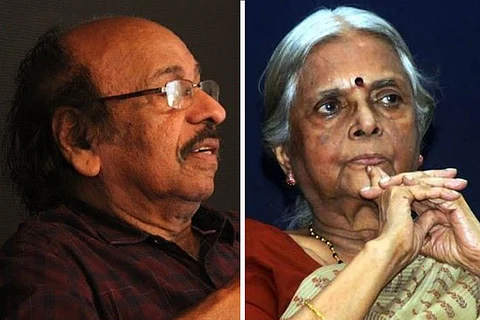

To me, Sugatakumari was both a sister and a fellow poet of the preceding generation, who the poets of my generation looked up to. I started reading her poems in Mathrubhumi weekly while I was still in school. I started scribbling lines then, which I now see as no more than an aspirant's stammering verses. I was 15 when her first collection 'Muthuchippi' was published.
Since those days, I have followed her poetry until the last one that was published, once again, in the same weekly. Her early poems were mostly solipsistic in their approach, even masochistically melancholic in their tone. But gradually, she began to recognise others' pain in her grief: not just of human beings but of every moving and nonmoving things. She grew up imbibing the Gandhian values pursued by her poet-father Keshava Pillai, also known as Bodheswaran. Her compassion grew with her poetry to embrace all creations.
She inherited the ethical and rebellious spirituality of the Bhakti tradition, too. There was a Meerabai in Sugathakumari, who was in search of her divine lover Krishna through her poems. She also never stopped identifying herself with the helpless and the marginalised, the poor and the outcast, for whom she built shelters in her heart as well as in brick and mortar (Abhaya centres for homeless women and children). Her activism, both social and environmental, was an extension of her poetry — they formed a seamless continuum.
Right from the struggle to save the ecologically sensitive Silent Valley to the battle against the luxury of an airport at Aranmula that would ruin the whole ecosystem of the locality, Sugathakumari consistently stood up to protect Kerala from the profit-seeking marauders and from their capitalist idea of 'development', which would benefit just a few while displacing a lot of poor people or taking away their jobs. There are still some who think it was all inspired by a foolishly romantic love of nature.
True, she was a great lover of nature but now the whole mankind has, hopefully, begun to listen to nature's message delivered through floods, droughts and epidemics. Sugatakumari will be remembered and celebrated by the posterity for her foresight about the future of mankind and the all-embracing compassion that illuminates her poetry.
As a young poet, I always visited her when I went to Thiruvananthapuram, often with my partner. She once wrote a letter to a newspaper editor, blessing me after reading my poem on Vyloppilli (a prominent Malayalam poet). She released my book Bahuroopi (2011). I interviewed her for Doordarshan when she was awarded the Saraswati Samman award (for outstanding prose or poetry literary works), which made her immensely happy. I wrote a poem addressing her as my sister, ‘Sugatakumariyodu’ (To Sugathakumari) in response to her poem, ‘Iniyee manassil kavithayilla’ (There is no more poetry in my mind).
K Satchidanandan is a renowned Malayalam poet and literary critic (writing both in English and Malayalam). He is also an advocate for causes pertaining to human rights, anti-caste, environment and free software. Satchidanandan is also the director of Kerala Literature Festival and the former secretary of Sahitya Akademi.